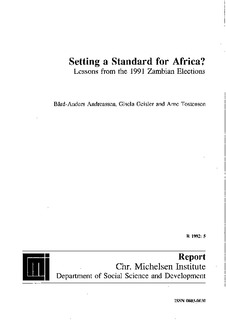| dc.contributor.author | Andreassen, Bård-Anders | |
| dc.contributor.author | Geisler, Gisela | |
| dc.contributor.author | Tostensen, Arne | |
| dc.date.accessioned | 2008-03-13T07:59:57Z | |
| dc.date.accessioned | 2017-03-29T09:12:58Z | |
| dc.date.available | 2008-03-13T07:59:57Z | |
| dc.date.available | 2017-03-29T09:12:58Z | |
| dc.date.issued | 1992 | |
| dc.identifier.issn | 0803-0030 | |
| dc.identifier.uri | http://hdl.handle.net/11250/2435987 | |
| dc.description.abstract | This report provides an assessment of the transition to a multi-party system of government in Zambia. The first section gives a general background to processes of democratisation in Africa, while the subsequent ones deal specifically with the situation in Zambia, particularly the general elections held in October 1991. Special attention is devoted to the political context of the election campaign and the domestic and international efforts in monitoring the elections, as well as the role of donor agencies in that process. The elections are judged on balance to have been free and fair despite some irregularities. A conc1uding section discusses prospects for consolidating democratic procedures and practices. Finally it offers some suggestions as to how donors may support a further deepening of the democratisation process. | |
| dc.language.iso | eng | |
| dc.publisher | Chr. Michelsen Institute | |
| dc.relation.ispartofseries | Research report | |
| dc.relation.ispartofseries | R 1992: 5 | |
| dc.subject | Democratisation | |
| dc.subject | Elections | |
| dc.subject | Monitoring | |
| dc.subject | Zambia | |
| dc.title | Setting a Standard for Africa? Lessons from the 1991 Zambian Elections | |
| dc.type | Research report | |
